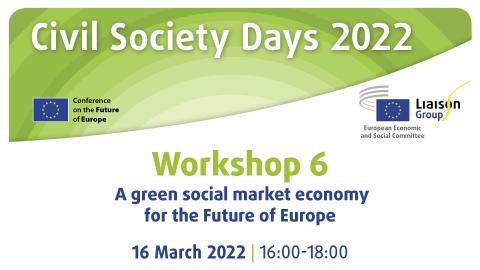European Economic
and Social Committee
Workshop 6: A green social market economy for the Future of Europe
16 March 2022 – 16:00-18:00
Organised by: Union of European Federalists (UEF) and Social Economy Europe (SEE) in cooperation with the EESC section for Economic and Monetary Union and Economic and Social Cohesion (ECO) and the EESC Consultative Committee on Industrial Change (CCMI)
Live streaming: https://youtu.be/DWl6rdO621E
Programme
16:00-16:30 Opening remarks:
- Dubravka Šuica, European Commission Vice-President for Democracy and Demography – Reflections from the Conference on the Future of Europe
- Pietro De Lotto, President of the EESC Consultative Committee on Industrial Change (CCMI)
- Ioannis Vardakastanis, EESC member, President of the European Disability Forum – The social market economy as a driver of inclusion and cohesion, for an economy that works for all
16:30-17:30 Roundtable – Strengthening Europe’s Green Social Market Economy – EU perspectives and concrete initiatives:
Presented and moderated by Dr Luca Lionello (Chair of Political Commission 4 "Economic, Fiscal Policies & Social Policies" of the UEF) and Laura Almirante (Social Economy Europe)
- Markus Ferber, MEP (EPP, DE), Vice-President of UEF
- Patrizia Toia, MEP (S&D, IT), Co-Chair of the Social Economy Intergroup
- Sandro Gozi, MEP (Renew, FR), President of UEF
- Iñigo Albizuri, Head of Global Public Affairs at Mondragon Corporation (the largest group of workers’ owned cooperatives in the world), President of CICOPA
- Heather Roy, Secretary General at Eurodiaconia and member of SEE Board of Directors
- Petro Darmoris, Board Member at Ukrainian Social Academy: Boosting youth social economy entrepreneurship in Europe
- Q&A
17:30-18:00 Closing remarks:
- Anna Echterhoff, UEF Secretary General
- Patrizia Bussi, Vice-President of Social Economy Europe and director of ENSIE
- Delphine Moralis, Chief Executive Officer at Philea
- Ann Branch, Head of Unit for Social and Inclusive Entrepreneurship at the European Commission (DG EMPL).
Concept note
The concept of a social market economy only found its way into the Treaties with the Treaty of Lisbon. In the Treaty on European Union, the European Union undertakes to establish an internal market and to work towards a "highly competitive social market economy, aiming at full employment and social progress, and a high level of protection and improvement of the quality of the environment" (Article 3, paragraph 3 TEU). The central idea of the social market economy is to protect the free economy and ensure properly functioning competition, whilst promoting prosperity and social security.
The social economy is an essential component of Europe’s social market economy. Its 2.8 million enterprises and organisations – mostly cooperatives, mutuals, associations (including charities), foundations, social enterprises and other legal specific legal forms – employ 13.6 million people, account for 8% of GDP and foster innovative, citizen-driven solutions to the main socio-economic and environmental challenges of our time. These companies are united in their diversity around common values and features such as the primacy of people, and the social objective over capital – reinvestment of most profits/surpluses to carry out activities in the interest of members/users (collective interest) or society and local communities at large. The Commission has recently launched an Action Plan for the Social Economy, as part of its agenda to build an economy that woks for people and the planet.
Today, the social market economy is exposed to global competition with other political and economic systems. The challenges we face in Europe require adjustments to the concept of the social market economy. This is particularly visible in respect of its social dimension: inequalities are on the increase and economic growth no longer automatically leads to higher incomes and more opportunities. Furthermore, we are faced with environmental and climate policy challenges that require an ecological renewal of the social market economy, moving towards an eco-social market economy. This further development can only succeed if there is a joint effort among the various players. While the European Union is called upon to play a more active role to support welfare policies in the Member States, national governments should make sure that all Europeans enjoy the same level of social protection across the EU. At the same time, business science and civil society can all make an important contribution to shaping the European social model of the future, by
- identifying areas for action and the levels at which such action needs to be taken for this renewal;
- analysing the new tools that the European Union has created to focus on the social dimension of the Green Deal (e.g. the Just Transition Fund);
- studying the impact of the temporary Support to mitigate Unemployment Risks in an Emergency (SURE), designed to protect jobs and workers affected by the pandemic;
- defining the role of individual players, i.e. the European Union, Member States, regions, local authorities, the market and civil society, in this renewal process, and
- formulating key proposals and calls for action;
- making sure that the Conference on the Future of Europe serves as a catalyst to strengthen the social market economy as an essential component of our European identity, democracies and way of living.
